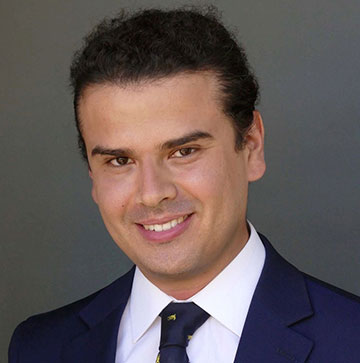
Nicolás Quesada
In this installment of Senior Member Insights, OPN talks with Nicolás Quesada, an assistant professor in the engineering physics department at Polytechnique Montréal, Canada, and a Ministry of Economy and Innovation (MEI) research chair in quantum photonics. His group develops the theory and computational tools underpinning the next generation of nonclassical bright light sources and devices needed for building fault-tolerant quantum computers, quantum communication networks and quantum sensors. Prior to joining Polytechnique, he worked at Xanadu Quantum Technologies as a lead developer of Strawberry Fields and The Walrus software libraries and led their theoretical efforts to demonstrate photonic quantum advantage. Before working in industry, he was a Natural Sciences and Engineering Research Council of Canada postdoctoral fellow and, as a Ph.D. student, a Vanier and Stoicheff scholar at the University of Toronto, Canada.
What first interested you in pursuing science?
In my case, I was very interested in mathematical regularities. I thought it was pretty cool that astronomers could predict where planets would be and when comets would return. I also thought it was very impressive that we could use that knowledge to put human-made capsules in orbit and then send them outside the solar system.
What aspect of your current work do you find the most interesting or exciting?
Since coming back to academia, I have found working with students quite enjoyable. I also appreciate the freedom of pursuing my own ideas and research interests, even when they are not directly aligned with industry goals.
What tips for successful networking do you have for early-career professionals?
If you have the opportunity, in-person interactions, such as at conferences, are really great.
On the other hand, with the pandemic, it became obvious that having an online presence is very useful. At a minimum, having a Google Scholar profile (or similar) is important. Even better, have your own website! That forces you to write down (and keep in mind) a quick summary of what you do and where you want to go.
“ At a minimum, having a Google Scholar profile (or similar) is important. Even better, have your own website! ”
—Nicolás Quesada
What professional resources do you rely on to stay active and engaged with your field?
These days I find lots of useful ideas and have many interesting interactions on Mastodon and Twitter.
What skills do you think are most important for someone interested in a career like yours?
Regarding technical skills, I recommend using the proper tools for writing code for your research.
In physics/photonics, code is just a way to a means, but this should not mean that it can be disorganized. By using tools developed by software engineers, such as version control, unit testing and automatic documentation, one can, in the long run, save significant amounts of time and also allow others to directly build on top of the work that’s already been done.
In the non-technical skills category, I consider the ability to write and communicate effectively to be very important. In many technical roles, in industry and academia, you will spend a lot of time writing—whether it is reports, white papers or scientific articles. You might as well spend some time cultivating that ability, since you will use it a lot.
“ To young scientists in areas similar to mine (physics), I can say that their abilities are valued—monetarily and otherwise—in many industries. ”
—Nicolás Quesada
What advice do you have for young scientists who are discouraged about their current work or career path?
Giving general advice is hard. To young scientists in areas similar to mine (physics), I can say that their abilities are valued—monetarily and otherwise—in many industries. I know this for certain, given the varied and rewarding career paths that my friends from graduate school have taken in the private sector.
What is one piece of advice that you wish you were given as a student/early in your career?
If you want to pursue a career in academia, you should observe how the hiring process works while you are a graduate student/postdoc. A great way to do this is to volunteer to be part of hiring committees.
What has been the most motivating factor throughout your career?
I almost always had compelling problems to work on. I also had very smart and interesting people I could talk to about those problems and also socialize with outside of work.
What habits do you frequently rely on that help you to succeed?
I like using list apps to keep track of things I need to do.
If your ten-years-younger self was looking at your career now, what would he/she be most surprised by?
That I worked for a while in “the real world” (outside of academia), and it had nothing to do with finance. More generally, even for theorists these days, you can find very interesting work in industry.
